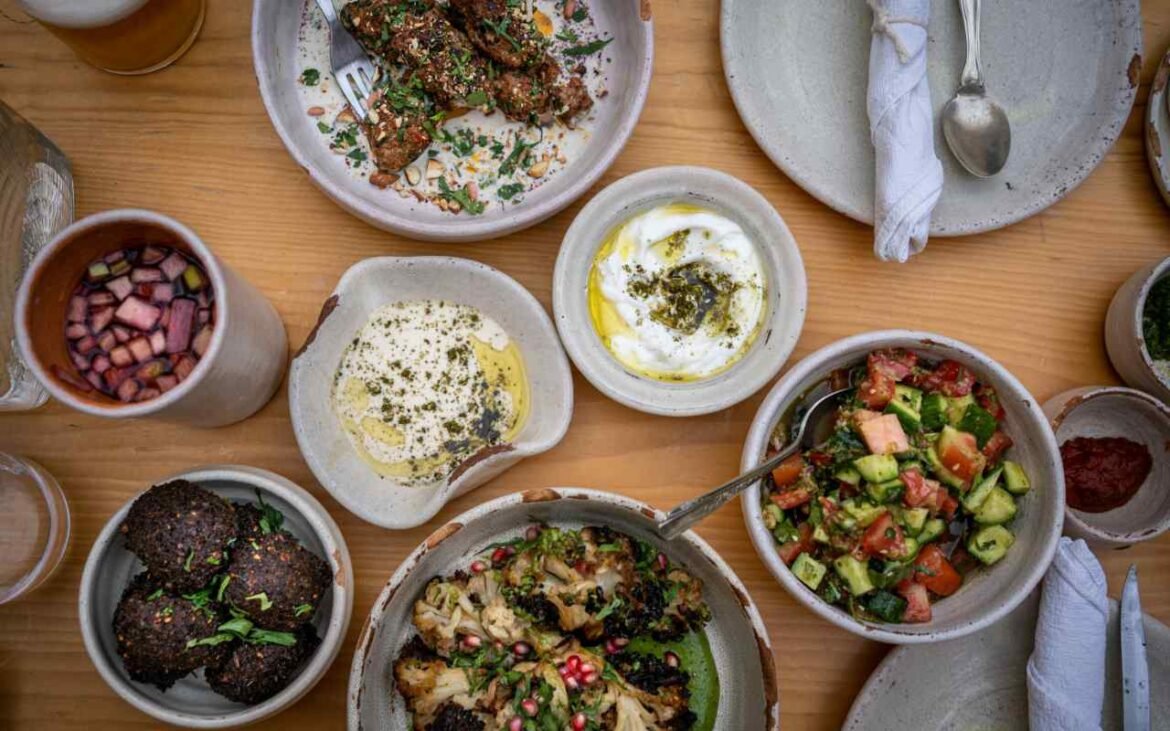Table of Contents
Ever wondered why people living around the Mediterranean Sea seem to have cracked the code on healthy aging? It turns out their traditional way of eating – what we now call the Mediterranean Diet benefits – might just be one of the most powerful tools for promoting longevity that science has ever studied.
You’ve probably heard the buzz about this eating pattern, but here’s what makes it truly special: it’s not just another fad diet that’ll leave you counting calories or eliminating entire food groups. Instead, it’s a lifestyle approach that’s been naturally tested by entire populations for thousands of years. And the research? Well, it’s pretty mind-blowing.
What Makes the Mediterranean Diet So Special?
The Mediterranean Diet isn’t really a “diet” in the traditional sense – it’s more like a blueprint for how entire cultures have been eating for generations. Picture the sun-soaked coastlines of Greece, Italy, and Spain, where meals are celebrations and food is medicine.
At its core, this eating pattern emphasizes:
- Fresh fruits and vegetables (think colorful, seasonal produce)
- Whole grains that haven’t been stripped of their nutrients
- Extra-virgin olive oil as the primary fat source
- Fish and seafood rich in omega-3s
- Legumes, nuts, and seeds for plant-based protein
- Moderate amounts of dairy, eggs, and red wine
What’s equally important is what’s limited: red meat appears only occasionally, and highly processed foods are rare. It’s about embracing whole, real foods that nourish your body from the inside out.
How Does the Mediterranean Diet Actually Boost Longevity?
Cardiovascular Health: Your Heart’s Best Friend
Here’s where things get really exciting. Research involving over 25,000 women found that those following the Mediterranean Diet closely experienced up to a 23% lower risk of death from any cause. That’s not just impressive – it’s life-changing.
The magic happens through multiple pathways:
- Improved cholesterol profiles with higher HDL (good cholesterol)
- Reduced inflammation throughout the body
- Better insulin sensitivity for stable blood sugar
- Lower blood pressure naturally
Think of your cardiovascular system as your body’s highway network. The Mediterranean Diet essentially provides premium fuel that keeps traffic flowing smoothly for decades longer than the standard Western diet.
Fighting Inflammation: The Silent Health Destroyer
Chronic inflammation is like a slow-burning fire in your body that accelerates aging and disease. But here’s the good news: the Mediterranean Diet is packed with natural anti-inflammatory powerhouses.
Olive oil contains oleocanthal, a compound that works similarly to ibuprofen but without the side effects. Fatty fish like salmon and sardines deliver omega-3 fatty acids that actively cool inflammatory processes. Colorful vegetables and fruits flood your system with antioxidants that neutralize harmful free radicals.
One study published showed that people following this eating pattern had significantly lower levels of C-reactive protein and other inflammatory markers – basically, their bodies were aging more slowly at the cellular level.

The Fiber Factor: Your Gut’s Highway to Health
The Mediterranean Diet delivers an impressive amount of dietary fiber – around 30-40 grams daily compared to the measly 15 grams most Americans get. This isn’t just about keeping things moving (though that’s important too!).
Fiber acts like a prebiotic, feeding the beneficial bacteria in your gut. These microscopic allies:
- Produce short-chain fatty acids that protect against colon cancer
- Support immune function (about 70% of your immune system lives in your gut)
- Help regulate mood through the gut-brain connection
- Assist with weight management by promoting satiety
Consider your gut microbiome as your body’s internal garden – the more diverse “plants” (fiber sources) you feed it, the more it flourishes and supports your overall health.
Omega-3 Fatty Acids: Brain Food for Life
The Mediterranean emphasis on fatty fish isn’t just delicious – it’s brilliant for cognitive health. Omega-3 fatty acids, particularly DHA and EPA, are literally building blocks for your brain cells.
Studies have shown that people following Mediterranean eating patterns have:
- Slower cognitive decline as they age
- Reduced risk of Alzheimer’s disease
- Better memory and focus throughout life
- Lower rates of depression and anxiety
It’s like providing premium maintenance for your brain’s hardware while keeping the software running smoothly.
What Does the Science Actually Say About Longevity?
The research on Mediterranean Diet benefits for longevity isn’t just impressive – it’s overwhelming. Let’s dive into some key findings:
The Nurses’ Health Study: 25 Years of Data
This landmark study followed women for over two decades and found that those most closely following the Mediterranean Diet showed significant improvements in biomarkers associated with aging. Specifically, they had:
- Lower insulin resistance (better blood sugar control)
- Reduced inflammatory markers
- Better lipid profiles
- Healthier body composition
The PREDIMED Study: Real-World Results
This large-scale Spanish study randomly assigned people to either a Mediterranean Diet with extra olive oil, Mediterranean Diet with extra nuts, or a low-fat control diet. The Mediterranean groups showed:
- 30% reduction in major cardiovascular events
- Significant improvements in cognitive function
- Better weight management despite no calorie restrictions
- Reduced cancer risk, particularly breast cancer
Blue Zones Connection
It’s no coincidence that several of the world’s “Blue Zones” – areas where people commonly live past 100 – follow Mediterranean-style eating patterns. Places like Sardinia, Italy, and Ikaria, Greece, show us real-world examples of this diet’s longevity benefits in action.
Beyond Food: The Mediterranean Lifestyle Advantage
Here’s something most diet articles miss: the Mediterranean approach isn’t just about what you eat – it’s about how you live.
Social Connection and Meal Sharing
In Mediterranean cultures, meals are social events. Families gather, friends connect, and food becomes a vehicle for relationships. This social aspect contributes to longevity through:
- Reduced stress levels
- Better mental health
- Stronger support networks
- Mindful eating practices

Physical Activity as Daily Life
Rather than hitting the gym for intense workouts, Mediterranean cultures incorporate movement naturally:
- Walking as primary transportation
- Gardening for food production
- Dancing as celebration
- Swimming in the sea
This consistent, moderate activity pattern supports cardiovascular health and maintains muscle mass throughout aging.
Stress Management Through Tradition
The Mediterranean lifestyle includes natural stress-busters:
- Afternoon siestas for recovery
- Slower meal paces for digestion
- Connection with nature through outdoor living
- Community celebrations for joy and belonging
Practical Ways to Embrace Mediterranean Diet Benefits
Start with Simple Swaps
You don’t need to overhaul your entire kitchen overnight. Begin with these manageable changes:
Replace butter with extra-virgin olive oil for cooking and dressings
Choose whole grain versions of bread, pasta, and rice
Add a serving of fish twice per week
Snack on nuts and seeds instead of processed foods
Include a salad with every lunch and dinner
Mediterranean-Inspired Meal Ideas
Breakfast: Greek yogurt with berries, walnuts, and a drizzle of honey
Lunch: Chickpea and vegetable soup with whole grain bread
Dinner: Grilled salmon with roasted vegetables and quinoa
Snack: Apple slices with almond butter
Shopping List Essentials
Stock your kitchen with these Mediterranean staples:
- Extra-virgin olive oil (invest in quality)
- Canned fish (salmon, sardines, anchovies)
- Dried legumes (lentils, chickpeas, white beans)
- Nuts and seeds (almonds, walnuts, pine nuts)
- Whole grains (quinoa, farro, bulgur)
- Frozen vegetables for convenience
For more comprehensive guidance on healthy eating patterns, check out our ultimate balanced diet guidelines that complement the Mediterranean approach.
Common Myths About the Mediterranean Diet
“It’s Too Expensive”
While quality olive oil and fresh fish can cost more upfront, the Mediterranean Diet can actually save money by:
- Reducing medical expenses through better health
- Emphasizing affordable legumes as protein sources
- Using seasonal, local produce when possible
- Preparing more meals at home
“It’s Too Time-Consuming”
Mediterranean cooking is often simpler than you think:
- Many dishes use minimal ingredients
- Preparation techniques are straightforward
- Batch cooking works perfectly for legumes and grains
- Fresh ingredients need less manipulation
“You Must Drink Wine”
While moderate red wine consumption is traditional, it’s not required. The health benefits come primarily from the food patterns, and you can:
- Choose grape juice for antioxidants
- Focus on other fermented foods like yogurt
- Emphasize the plant-rich aspects of the diet
Measuring Your Mediterranean Diet Success
Beyond the Scale
While weight management often improves naturally, focus on these health markers:
- Energy levels throughout the day
- Sleep quality and recovery
- Digestive comfort and regularity
- Mood stability and mental clarity
- Blood pressure and cholesterol (if monitored by healthcare provider)
Long-term Thinking

Remember, Mediterranean Diet benefits compound over time. You’re not looking for quick fixes but rather sustainable improvements that support lifelong health and vitality.
Frequently Asked Questions
Can I Follow the Mediterranean Diet if I’m Vegetarian?
Absolutely! The Mediterranean Diet is naturally plant-forward. Simply emphasize:
- Legumes and nuts for protein
- Whole grains for sustained energy
- Plenty of vegetables and fruits
- Healthy fats from olive oil and avocados
If you include dairy and eggs, you’ll have even more options for complete nutrition.
How Quickly Will I See Results?
Most people notice improvements in energy and digestion within 2-3 weeks. More significant changes like:
- Blood pressure improvements: 6-8 weeks
- Cholesterol changes: 8-12 weeks
- Weight management: Gradual over 3-6 months
- Inflammation reduction: 8-16 weeks
Is the Mediterranean Diet Safe for Everyone?
The Mediterranean Diet is generally safe for most people, but consult your healthcare provider if you have:
- Specific food allergies or intolerances
- Chronic medical conditions requiring dietary modifications
- Concerns about medication interactions
Can I Combine Mediterranean Eating with Other Healthy Practices?
Definitely! The Mediterranean Diet works beautifully alongside:
- Regular exercise routines (check out our strength training guide for beginners)
- Stress management techniques
- Adequate sleep practices
- Social connection activities
Making Mediterranean Diet Benefits Part of Your Life
The beauty of the Mediterranean Diet lies in its sustainability. Unlike restrictive eating plans that leave you feeling deprived, this approach celebrates food, flavor, and the joy of eating well. It’s about adding beneficial foods rather than eliminating entire categories.
Start small. Maybe this week you’ll try a new fish recipe or experiment with lentils in your soup. Perhaps you’ll swap your usual cooking oil for extra-virgin olive oil or add a handful of walnuts to your morning oatmeal.
Remember, the people of the Mediterranean didn’t follow this pattern because they knew it would extend their lives – they simply ate what was available, seasonal, and traditional. The longevity benefits were a beautiful side effect of living in harmony with their environment and community.
Your journey toward better health doesn’t require perfection. It requires consistency, patience, and a willingness to embrace foods and practices that have nourished humans for millennia. The Mediterranean Diet benefits aren’t just about adding years to your life – they’re about adding life to your years.
Ready to start your Mediterranean journey? Begin with one small change today. Your future self will thank you for every colorful vegetable, every drizzle of olive oil, and every mindful meal that brings you closer to the vibrant health that’s your birthright.
For more insights on sustainable approaches to health and wellness, explore our comprehensive guides on managing anxiety naturally and women’s wellness that complement the Mediterranean lifestyle beautifully.



4 comments
[…] it to any cuisine, dietary preference, or lifestyle. Whether you’re vegetarian, following a Mediterranean diet, or have specific food allergies, the principles remain the […]
[…] Mexican-inspired meals might combine cumin, chili powder, and lime with your base grains and beans. Mediterranean dishes could feature olive oil, oregano, and garlic. Asian-influenced meals might include ginger, soy […]
[…] your other dietary goals as well. If you’re following a Mediterranean-style eating pattern, plant-based protein snacks fit perfectly with the emphasis on legumes, nuts, and […]
[…] Mediterranean-inspired combinations like Greek yogurt with olives, cucumber, and za’atar. Or go Asian-fusion with edamame hummus […]